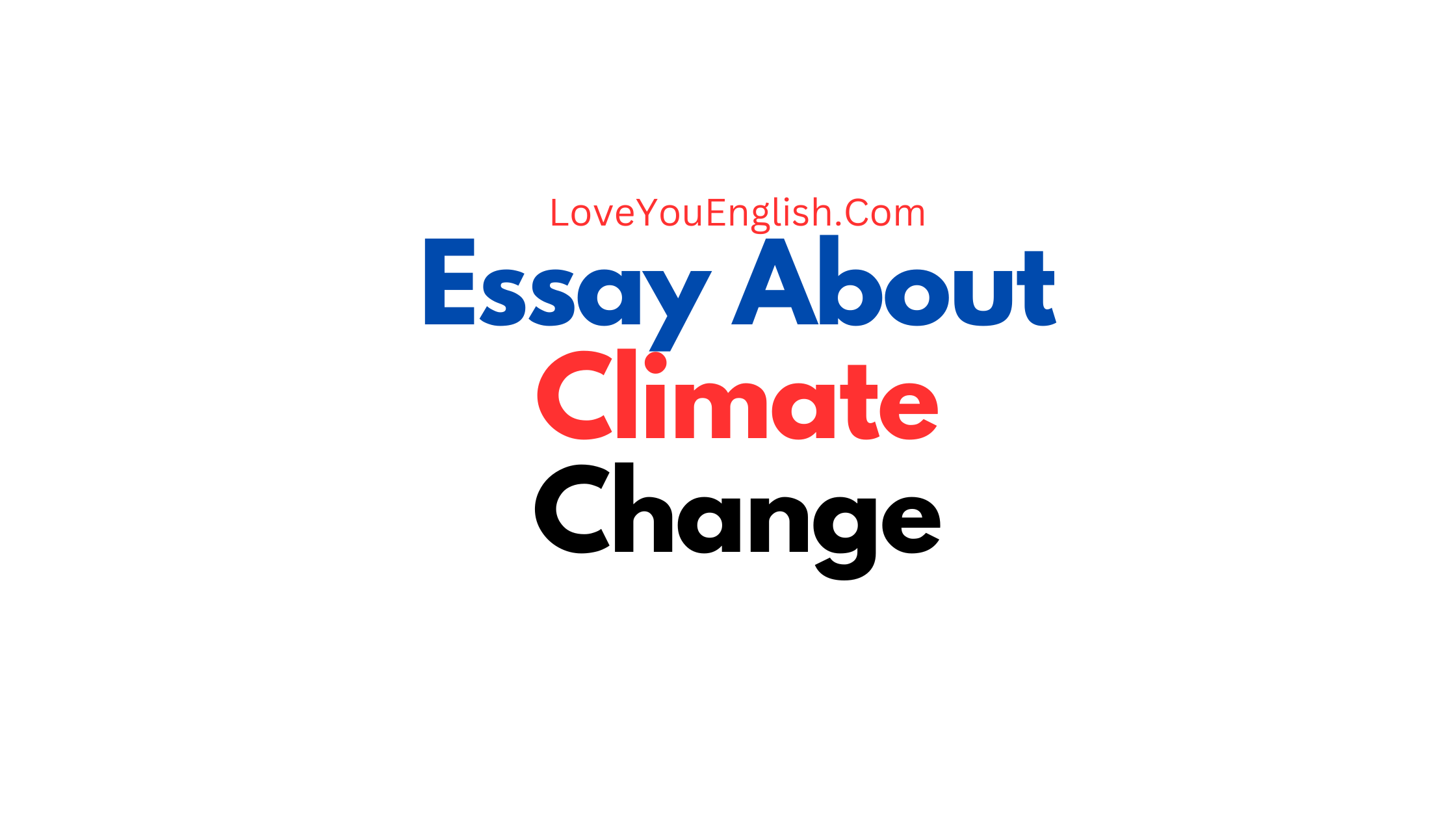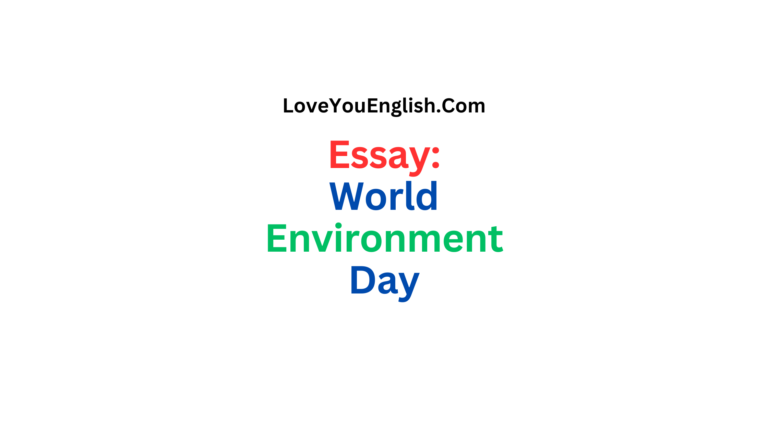Climate Change Essay for Students and Children
Climate Change Essay for Students and Children
Climate change is a huge issue that our planet is dealing with right now.
It impacts everything on Earth, including the environment, animals, our health, food supply, and the economy.
It’s super important to know what causes climate change and how it affects us so we can figure out ways to tackle this problem and reduce its impact.
So, what exactly is climate change?
It’s when the climate patterns around the world or in certain areas change over a long time.
These changes can lead to higher temperatures, different rainfall patterns, more severe weather events, rising sea levels, and shifts in ecosystems.
The Earth’s climate has always changed naturally due to factors like its orbit, volcanic eruptions, and variations in the sun’s energy.
However, the rapid warming we’ve noticed recently is mainly due to human activities, such as burning fossil fuels (like coal, oil, and gas) and deforestation.
These actions release a lot of greenhouse gases into the atmosphere.
Greenhouse gases, such as carbon dioxide and methane, trap heat from the sun and prevent it from escaping into space.
This process is known as the greenhouse effect, and it’s a natural phenomenon that keeps the Earth warm enough for life.
But when there are too many of these gases in the air because of human actions, it intensifies the greenhouse effect, leading to global warming and disrupting the Earth’s climate system.
Now, what causes climate change?
It mainly occurs because of human activities. The key reasons for climate change are actions that release greenhouse gases into the atmosphere.
These include burning fossil fuels: When we burn coal, oil, and natural gas to generate electricity, drive cars, or produce goods in factories, it releases carbon dioxide, a powerful gas that traps heat in the atmosphere, making the Earth warmer.
Another cause is deforestation: Forests act like large sponges that absorb carbon dioxide from the air.
When we chop down trees to make space for farms or build cities, the carbon that was stored in those trees goes back into the atmosphere, which makes climate change even worse.
Farming methods: Some farming activities, like raising livestock and using specific fertilizers, produce gases known as methane and nitrous oxide.
These gases are super effective at trapping heat, which causes the Earth to heat up.
Industrial activities: Making products like cement or chemicals also releases greenhouse gases. These gases worsen the climate change issue.
Waste disposal: When we throw away food scraps or handle wastewater, it produces a gas called methane. Methane is a very strong greenhouse gas that adds to climate change.
Explore more topics:
- The Rise of Online English Teaching
- How to Write a Leave Email in English
- Top Online Resources to Improve Your English Skills
- Essays about Rabindranath Tagore
Climate change is causing a lot of negative impacts that influence everything on our planet.
Here are some key effects:
Rising temperatures:
The Earth is becoming warmer due to climate change.
Since the late 1800s, the average temperature has increased by about 1.1°C (2°F).
If we continue to emit greenhouse gases, temperatures will rise even more.
This can lead to glaciers melting, higher sea levels, and more intense heat waves, droughts, and wildfires.
Altered precipitation patterns:
Climate change disrupts the water cycle, which means some areas may experience more rain and snow, resulting in floods.
Meanwhile, other regions might suffer from a lack of rainfall, leading to droughts. These shifts in water availability can impact our drinking water supply and food production.
Increased extreme weather:
As the climate warms, we are witnessing more frequent and severe weather events like hurricanes, typhoons, and intense storms.
These occurrences can cause significant damage to infrastructure and disrupt people’s daily lives.
Rising sea levels:
When temperatures rise, ice from glaciers and ice sheets melts, adding more water to the oceans.
Additionally, warmer ocean water expands, contributing to rising sea levels.
This poses a serious threat to coastal communities, leading to flooding and forcing people to evacuate their homes.
Disruption of ecosystems:
Climate change is also impacting the habitats of various plants and animals.
Some species are relocating to different areas, while others may face extinction.
Climate change can disrupt the natural balance, making it tougher for people to access essential resources like food and clean water.
Food and water shortages:
As the climate shifts, farmers may struggle to grow their crops due to unpredictable weather patterns.
Additionally, finding clean water can become challenging because of changes in rainfall and melting glaciers.
This situation could lead to some individuals not having enough food or safe drinking water, particularly in areas that were already facing difficulties.
Health issues:
Climate change can lead to various health problems.
Extreme heat can cause heat-related illnesses, and the changing climate can increase the spread of diseases carried by insects like mosquitoes.
Moreover, air quality may worsen due to climate change, making it harder for people to breathe.
All these factors can create stress and anxiety, potentially leading to mental health challenges.
Economic troubles:
Climate change can result in significant economic issues, such as damaging infrastructure, disrupting supply chains, and making it difficult for farms and factories to operate effectively.
This can lead to job losses, increased poverty, and an unstable economy, especially in regions that heavily depend on climate-sensitive industries.
You may want to read more:
- US Independence Day: July 4 USA Holiday, History, Significance
- Essay Writing: Students should have limited access to the internet
- Essay on Social Media for School Students and Children
Tackling Climate Change
To tackle climate change, it’s important for everyone around the globe to join forces in reducing the gases that heat up our planet and to prepare for the changes that are already taking place.
Here are some ways we can help with climate change:
Switching to renewable energy:
Instead of relying on coal and oil, we can harness energy from sources like the sun, wind, water, and geothermal heat to produce fewer harmful gases.
Governments, companies, and individuals can work together to improve and promote these renewable energy options.
Using energy more efficiently:
By reducing energy consumption in our homes, vehicles, and factories, we can lower the amount of harmful gases released.
This could involve better insulation in buildings, using energy-efficient appliances, and optimizing factory operations.
Protecting natural areas:
Keeping forests, wetlands, and other ecosystems healthy can help absorb harmful gases and protect various species of plants and animals.
Smart farming practices, such as agroforestry, minimal tillage, and using advanced technology, can also help reduce harmful emissions.
Reducing waste and reusing items:
By minimizing waste, finding better disposal methods, and reusing products, we can decrease the harmful gases produced from manufacturing, using, and discarding items.
There are many actions you can take as an individual to help combat climate change!
Here are some ways you can help the environment and lower your carbon footprint:
Conserve energy:
Always remember to switch off lights and gadgets when you’re not using them.
You can also set your thermostat to a comfortable level and choose energy-saving products to cut down on energy use and emissions.
Opt for eco-friendly transportation:
Instead of driving by yourself, consider walking, biking, taking public transport, or sharing rides whenever possible.
For long trips, think about flying less or using transportation that uses less fuel.
Reduce, reuse, and recycle:
By cutting down on what you buy, reusing items when you can, and recycling correctly, you can help reduce waste and give things a second life.
Climate change is a serious issue that requires everyone’s effort to tackle.
We can support clean energy by using solar panels or joining programs that promote renewable energy.
Making smart food choices, like eating less meat and choosing local and seasonal foods, is also important.
Additionally, it’s crucial to back businesses that prioritize the environment and to participate in campaigns and vote for leaders who are committed to fighting climate change.
If we work together, we can create a positive impact on our planet and for future generations.







